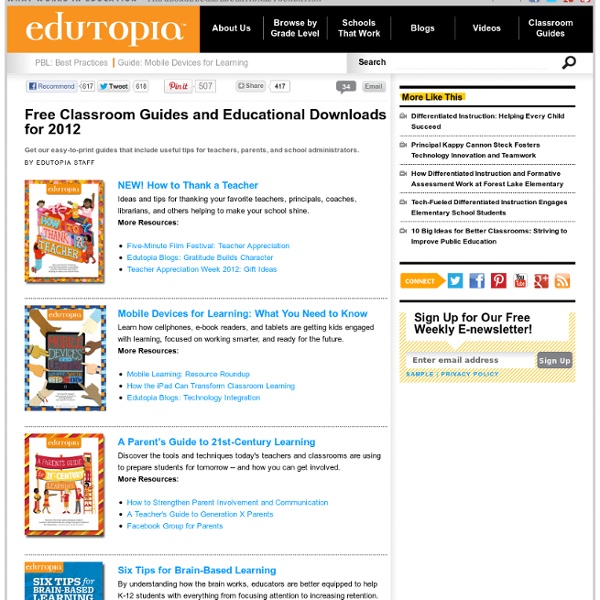Change Magazine - September-October 2010
by Cedar Riener and Daniel Willingham There is no credible evidence that learning styles exist. While we will elaborate on this assertion, it is important to counteract the real harm that may be done by equivocating on the matter. In what follows, we will begin by defining “learning styles”; then we will address the claims made by those who believe that they exist, in the process acknowledging what we consider the valid claims of learning-styles theorists.
Goal: 12 Resources for Giving Constructive Feedback
Posted by Shelly Terrell on Saturday, January 23rd 2010 Part of the Goals 2010 Challenge Series, Goal 22 and the Cool Sites series In the former school I taught at some of the students rallied together and complained to the principal about the previous teacher. The instructor thought it was because of the low grades they received in the class. When I was receiving the same group of students the following year I was really nervous.
Brain-Based Learning: Resource Roundup
Edutopia's list of resources, articles, videos, and links for exploring the connection between education and neuroscience. (Updated: 12/2013) Building Brain Literacy in Elementary Students, By Judy Willis, M.D. (2013) Neurologist, teacher, author and Edutopia blogger Willis discusses the benefits of teaching elementary students how their brains work. Brains, Brains, Brains! How the Mind of a Middle Schooler Works, by Heather Wolpert-Gawron (2013) Blogger Wolpert-Gawron launches this three-part series by advising middle school teachers to read up on brain research with insight on how the 'tween brain works.
The Teacher’s Survival Kit for Lesson Planning! Tips & 1000s of Free Lesson Plans
Posted by Shelly Terrell on Saturday, August 18th 2012 Goal 16: Plan An Engaging Lesson of The 30 Goals Challenge for Educators I cannot teach anybody anything, I can only make them think. – Socrates
1st Annual MTSS Conference Evaluation
Thank you for your interest in MTSS. Please take a few moments and provide your feedback regarding the 1st Annual MTSS Conference that was held March 13, 2012. As a result of the conference, do you feel you now have a better understanding of connections between the Massachusetts Tiered System of Supports (MTSS) and the following? As a result of the conference do you feel you now have a better understanding of the core components of MTSS, including why both academic and non-academic components are essential? As a result of the conference do you feel you now have a better understanding of how to teach more effectively through considering the variability of learners (UDL)?
The Power of the Positive Phone Call Home
When I first started teaching and was overwhelmed by the demands and complexity of the job, my survival strategy was simply to take all the advice that came my way and implement it. So when my wise mentor suggested that after the first day of school I call all of my second grader's parents, I did so. In spite of my exhaustion, I called each family and introduced myself. I asked a few questions about their child. I said that their kid had had a good first day.
Rethinking Whole Class Discussion
Whole class discussions are, after lecture, the second most frequently used teaching strategy, one mandated by the Common Core State Standards because of its many rewards: increased perspective-taking, understanding, empathy, and higher-order thinking, among others. These benefits, however, do not manifest without a skillful and knowledgeable facilitator. Unfortunately, a preponderance of evidence demonstrates that many teachers mistakenly conflate discussion with recitation. "Typical teacher-student discourse resembles a quiz show, with teachers asking a question, the student replying, and the teacher evaluating the student's response. This is called initiation-response-evaluation, 'I-R-E,' or recitation."1
Resources and Downloads for Differentiated Instruction
Tips for downloading: PDF files can be viewed on a wide variety of platforms -- both as a browser plug-in or a stand-alone application -- with Adobe's free Acrobat Reader program. Click here to download the latest version of Adobe Reader. Click on any title link below to view or download that file.
The Heart-Brain Connection: The Neuroscience of Social, Emotional, and Academic Learning
Richard: Thank you all very, very much. It really is just a delight to be here and an honor to be considered a part of this amazing collaborative which I have been a champion and fan of from afar and it's just great to be here and, in a very short amount of time, share with you what has been some absolutely amazing work that has been going on in neuroscience and its relevance to social and emotional education. And if there's one take home message that I'd like you to walk away with from my presentation today it's that social-emotional learning changes the brain. And the brain is really the organ that is the target of these interventions. So this is a very ambitious outline of what I hope to cover. I'm going to tell you a snippet about neuroplasticity, the idea that the brain is the organ that’s built to change in response to experience.
10 books to help boost young boys' reading
On Tuesday, the government announced its plan to get more children reading. It takes the form of a competition, aimed at seven- to 12-year-olds and slated to kick off in September, that will reward the young readers who devour the most books: the clear intention, as schools minister Nick Gibb put it, is "to give a competitive spur to reluctant readers". Both boys and girls will be eligible, but as boys make up the majority of these "reluctant readers" – one in 10 British boys are now leaving primary school with the reading-age of a seven-year-old – Gibb added that he hoped boys in particular would be inspired "by a bit of healthy competition".



